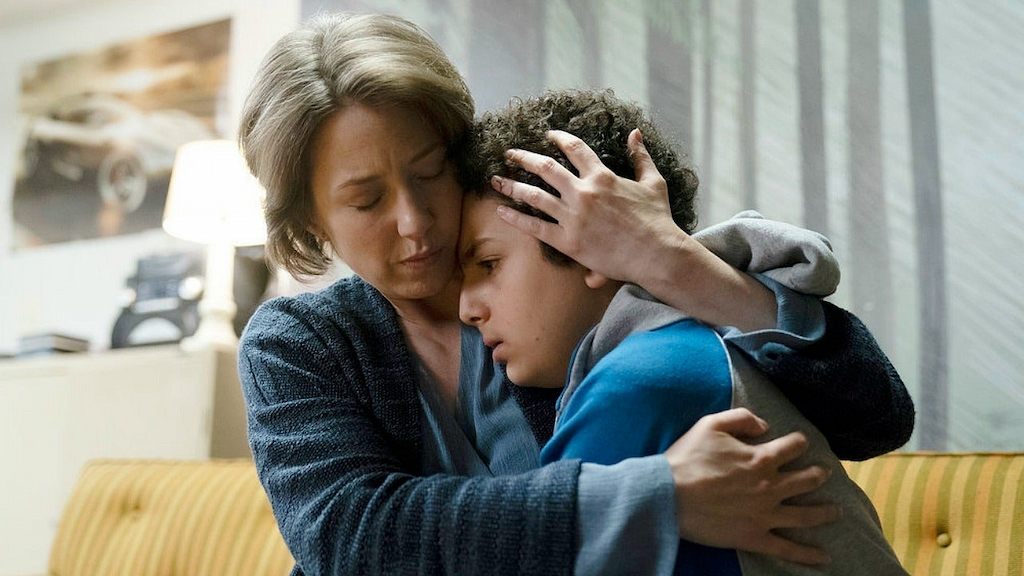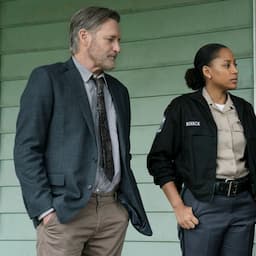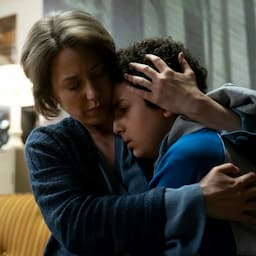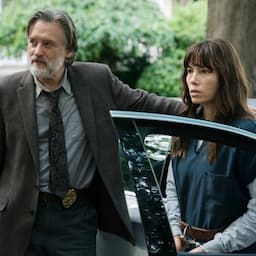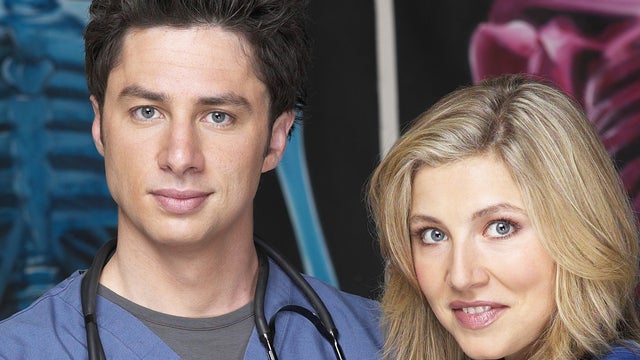Showrunner Derek Simonds talks to ET about differentiating the new installment from the season one and if Jessica Biel will reprise her role as Cora Tannetti.
The Sinner is back with a brand new "whydunit," and it may be twistier and more unsettling than ever.
The first installment of the USA Network crime drama answered why a young mother, Cora Tannetti (Jessica Biel), fatally stabs a man in broad daylight on a crowded beach, with, at first, seemingly no idea as to why she did it -- a mystery charted in Petra Hammesfahr's novel. The eight-episode chapter was met with acclaim by viewers and critics alike and earned Biel her first career Emmy nomination. The second season, which begins Wednesday, is wholly original and without a pre-set destination -- the focus shifting from a mother to a 13-year-old boy, Julian (Elisha Henig), who murders his parents with no obvious motive. In classic Sinner fashion, the question at hand devolves into a deeper exploration into the complex reasons behind the surprising circumstances that led to the shocking act.
"We were really fortunate with the success and popularity of the show in the first season, and it certainly put a lot of pressure on us to deliver this year," showrunner and executive producer Derek Simonds tells ET. "We were very attentive to the things that seemed to really work and were in the DNA of the show, and that was really delving into the psychology of our characters, looking at how trauma affects people and affects relationships, and how the compartmentalization of that trauma affects people later in life."
Ahead of The Sinner's return, ET jumped on the phone with Simonds to preview the second chapter of the addictive series and get answers to several burning questions, including if Biel will reprise her role as Cora in the new season (she remains an EP), why Carrie Coon was the only actress fit to take over and how the twists will play out much differently this time around.
ET: The Sinner became the surprise TV hit of 2017. How did the response affect your approach heading into season two?
Derek Simonds: We were really fortunate with the success and popularity of the show in the first season, and it certainly put a lot of pressure on us to deliver this year. (Laughs.) We didn't change our approach much. We were very attentive to the things that seemed to really work and were in the DNA of the show, and that was really delving into the psychology of our characters, looking at how trauma affects people and affects relationships, and how the compartmentalization of that trauma affects people later in life. And looking deeply at family relationships as well, like parents and children, and what gets passed between them. Those were the themes that we revisited this season. The other thing is I'm interested in telling female-driven stories, so we were mindful about creating a cast of new characters where there were some compelling female perspectives that were intrinsic to the storyline.
Season one was very much a close-ended story with a finite ending, in which the book served as a reference point. What were the challenges of not having any source material to go back to this time around?
The main challenge was, yes, we didn't have a blueprint. We diverged from the book in season one, but we certainly had pillars of plot that we knew we wanted to hit that were in the book. This year, we didn't have any of that kind of guidance, so we were essentially creating a new show from scratch -- apart from the Bill Pullman character, Detective Ambrose. That was definitely a challenge to tell a story with a beginning, middle and an end, with an entirely new cast of characters with their own histories and relationships. It took a lot of work on the writing side to bring what we hope is a novelistic depth to this season that the first season had. We've been refining and rewriting all the way through production. That was definitely the biggest challenge of this season in meeting a similar airdate as last year: forming the story and having it work in such a short time.
What's unique about The Sinner is it's built like a pseudo-anthology series, in that Bill Pullman is the only common thread from season one to two. When did you feel comfortable about continuing the story?
Honestly, whenever you pitch a show and try to get a show on the air these days, there is always the question of "What if in success..." So I always had in mind that Detective Ambrose would be a character that we would follow to other cases and that was a potential pamphlet for an ongoing series. With that in mind in season one, I sort of designed season one to be Cora's story, but Cora and Ambrose's relationship created a hand-off to Ambrose at the end of season one. Cora's story is completed, but his relationship with Cora forces him to crack the door open onto his own trauma and his own story. That's what we delve into, in part, in season two. In a way, season one was the setting up of Ambrose that we'll follow through the series. It was kind of in the DNA of our initial conception but we had no idea that the show would be as special as it was or that it would be renewed. I didn't have any clue what the next story would be for season two last September, when we were contemplating another season.
Jessica Biel continues as an executive producer for this installment after her critically acclaimed performance last year. Was it scary to let your lead go from a creative perspective?
Yeah. We all really felt close to Cora and even closer to Jessica, who is a dream to work with as a partner and a collaborator. It was a very bittersweet reality of moving on to season two. We felt Cora's story was finished in a dramatic sense and there were discussions about continuing her story. In the end, it felt like it wasn't enough for its own season and it would compete with new characters in a second season. We felt like we wanted to present The Sinner as a true anthology show in that way. There was a real challenge in that we don't have this incredible leading lady with charisma and talent, what are we going to do? We had faith in the writing process and the characters that emerged. I couldn't be happier with the three leading ladies that we have this season, led by Carrie Coon, who's an incredible actress. What we hope is The Sinner will be a show that people have faith that will continue to deliver season after season and present compelling new characters every time that people want to follow.
The finale left the possibility open for another appearance by Jessica and there had been talk that she may appear onscreen as Cora at least one more time. Bill Pullman told me that that didn't appear to be the case. So, is Jessica appearing at all in season two?
No, she's not appearing in season two. I wouldn't rule out anything for future seasons potentially.
How close were you to making that happen?
It was something that we discussed creatively while we were wondering what a second season would be. It was one of many ideas.
How has bringing Carrie Coon in as the new female lead informed the season? From the early episodes, Vera is quite a departure from Cora.
In season one, the character of Cora was someone who we were meant to sympathize with and relate to, and relate to her own confusion about what happened to her. In season two, the female characters don't occupy that role in the storytelling. That mainly goes to Elisha Henig, who plays Julian, the 13-year-old boy who commits the crime in the season. The character of Vera, she's a bit of a puzzle, an enigma and a formidable opponent and sometimes partner to Ambrose, so she occupies a very different of the story. She's someone who holds a lot of answers to the secrets of the show and unraveling the layers of her character will be a very different ride than with Cora. There are times when we are very suspicious of her and fearful of what she might do, and there are other times when she's incredibly sympathetic and that keeps changing throughout the season. It's what Carrie is talented at doing as an actress.
Carrie told me that she wasn't the first choice for the character of Vera. Is that true? If so, who did you originally reach out to?
(Laughs.) Carrie, on a creative level, from our very first casting discussions was a name we were all very excited about from the start. One of the things that we learned early on was that she had just given birth, so we didn't think there was any hope of getting her at all because he had just had a baby. It was only in the casting of [her husband] Tracy Letts of Jack Novak that we had more dialogues with him and in turn, with their family situation, and we realized that she was open to working. It was then that we made the offer.
Why is Carrie the perfect fit for Vera?
If you watch The Leftovers and Fargo, and if you've seen her film work -- and I've seen her on stage -- she is a rare talent. She really is. She's an incredible technician and she's also full of heart and has incredible instincts. She's smarter than most people I know, but she's very quick and fast on her feet, and has the analytical ability of a writer-director coupled with the instinctual ability of an actor. She's really just a formidable person. For the role of Vera, we needed someone who captured Vera's strength as a leader and as a woman who's really had to fight for where she's gotten. And at the same time, a woman who's in touch with her sexuality and with a maternal side. All of those pieces together, along with Vera's sense of mystery, she's alluring and a little frightening. In some ways, she's borne out of the tradition of the femme fatale in the noir aspects [of the story]. She has a lot of sides to her and Carrie was someone who seemed to have all of those aspects right at her fingertips already. The other thing I'll say about Carrie that I just love as an actor is she's not concerned about an audience liking the character she's playing. She's concerned about portraying the character as honestly as possible, which I think is why people end up liking her so much. (Laughs.) She's not someone who's looking for praise or to be liked. There's a real integrity to her approach as an actor, an honesty, and that seems in the DNA of Vera as a character.
Were there any concerns in having the new season centered around a child, in this case a 13-year-old boy, especially considering the difficult subject matter the show investigates?
It was a gamble. It was a concern that we all were nervous about from the start. Who will we find to play this character? The character of Julian is not your typical suburban boy. He comes from a unique background and has a unique quality to him. And also, as you'll see as the season progresses but already in the first two episodes, it's a very emotional and layered part. We kind of went forward on faith that we would find our Julian and we did, surprisingly, without much searching. Elisha Henig has been doing television already; we did not pluck him out of obscurity. His audition was head and shoulders, I can't even exaggerate, it was so far beyond anyone's interpretations of the part. When I met Elisha in person, I realized how precocious he really is. He's 13 but he's home-schooled and he's passed his high school equivalency. He reads challenging, adult novels; he's an incredibly sophisticated kid who is a total pro, and you talk to him like any other cast member. He's remarkable. It was exactly what we needed for Julian and the fact that he's also a talented actor who's in touch with his emotional life, it's been a dream come true.
The first season left a lot to be desired when it came to Ambrose's backstory and we're finally getting a glimpse into his own personal trauma in his childhood. What are you excited about exploring about Ambrose more deeply this season?
The one thing I knew I wanted to do in season two before I had any other ideas was to place Ambrose more at the center to reveal more about the character. I'm very excited that after all the glancing references Ambrose makes to what happened to him, we get a little fuller picture of that in season two. In a lot of ways, I imagine this show every season and every case that Ambrose encounters becomes a stage in his own psychological healing process in understanding himself and working through himself. The idea of season three, if we were to ever have one, will be another stage of Ambrose's journey reflected in a new criminal. I was excited to delve into that because he's a fascinating character, a survivor of his own trauma which resonates with all the other characters. Bill is just so wonderful and he's an actor who's driven by the art of it and he's so willing to roll up his sleeves and dive into the more difficult, raw aspects of the character.
How are you differentiating how the twists play out this season compared to last year?
Having a child at the center, we realized the mystery had to be about what happened around that child. In season one, it was all about the secrets buried in Cora's psyche. In season two, the why is less why did Julian kill, which we actually learn earlier on in the season, but it's what led to these circumstances that he found himself in. By the nature of that story, we realized that there were a lot of different perspectives, whereas in season one we stayed with Cora and Ambrose and a little bit with Mason, Cora's husband, but in season two, our perspectives are divided up between more characters. Each one of those characters knows a particular part of the larger story, so we're building this mosaic that's the meta-narrative out of all of these pieces -- that each person has a piece of that story. By the end of the season, audiences will have an understanding of the full narrative that way. It's a little more of an ensemble approach than diving into the psyche of just one character.
The Sinner premieres Wednesday, Aug. 1 at 10 p.m. ET/PT on USA Network.
RELATED CONTENT:
